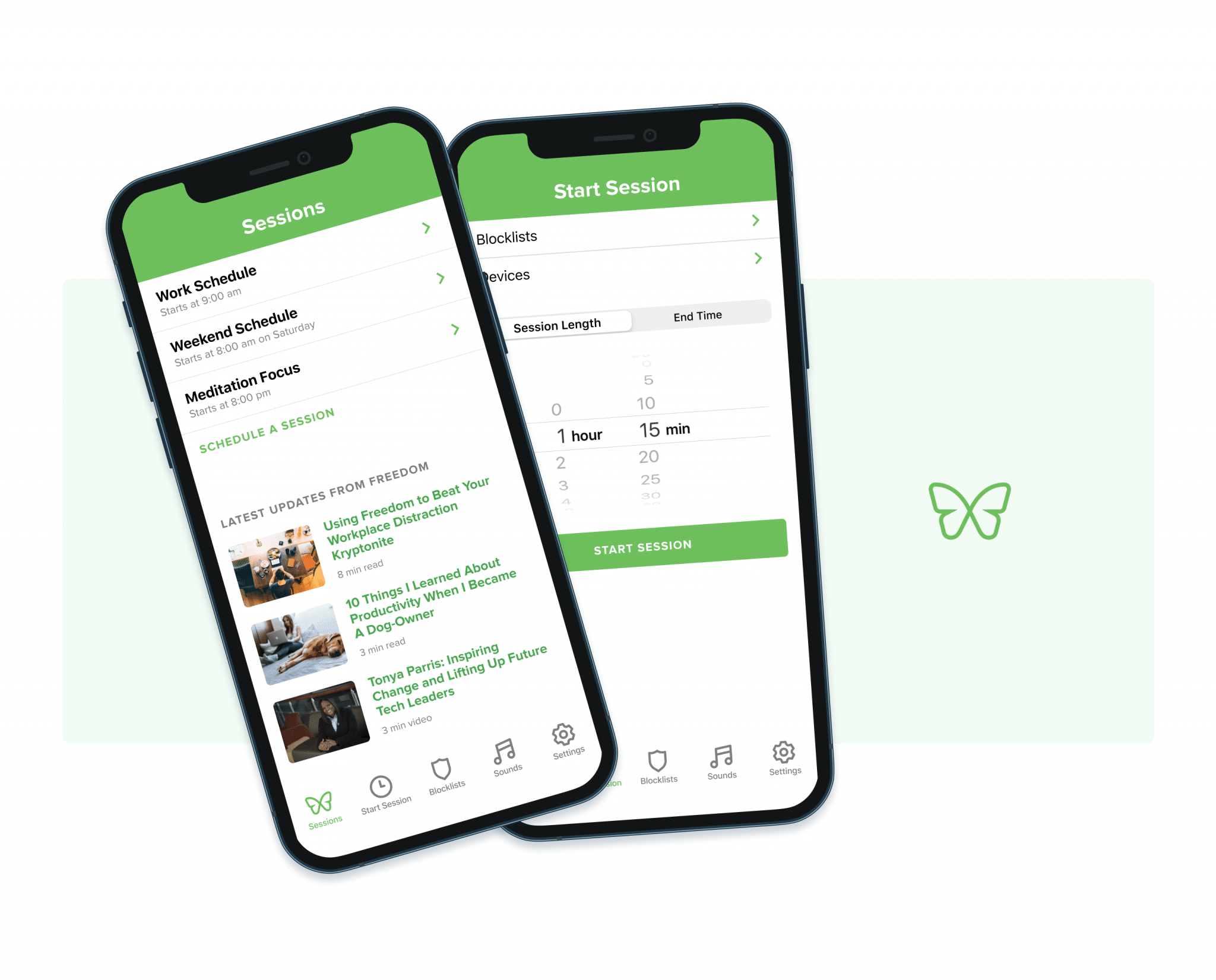How to Stay Focused on Studying, Backed by Research

[Updated February 23, 2024]
Studying is tough. Whether you’re a veteran student getting a Ph.D. or someone starting high school, figuring out how to stay focused while studying is a challenge that we all face. Whether your biggest challenge is social media, procrastination, time management, or a combination of all three, we’ve got a variety of tools and techniques that can help minimize the stress of studying and keep you focused on what matters.
And if you’re like most of us – this school year is presenting challenges we’ve never faced before. Learning remotely and losing the motivation and pressure that comes with in-person learning and contact has left many of us fighting off the internet like never before. So let’s dig in!
How to stay focused while studying, a guide:
1. Find a suitable environment.
Location, location, location. Finding where you work best is an essential part of any successful studying session. For some, the quiet of a library is essential, but for others, the light bustle of a coffee shop can be just the right amount of background noise to stay focused. But whatever your background noise preference, it’s important that your study spot has a few things –
- Flat, clear, surface with enough space to comfortably hold all your materials and laptop
- Outlets – if you need your computer to study, ensuring you have a close power supply can prevent the need to get up and break your flow
- Comfortable seating (or standing place) – When selecting a place to work, it’s important to try and pick a place that has the necessary furniture to promote good posture for prolonged, sustainable studying. Whether you use a comfortable desk chair with back support, an exercise ball, or standing desk, sitting upright has been shown to increase energy levels and confidence, as well as enhance overall mood. In addition, sitting in a slouched position can make your brain more predisposed to feelings of hopelessness.
- Need some help making sure you have the right set-up? Check out Yale’s recommendations for creating an ergonomic workstation here.
- Environments for remote learning and work:
- No access to coffee shops and libraries? Find a space at home that you can make your own office. Clear away clutter and make sure all your most-used tools are organized and within reach.
- Noisy roommates or neighborhood construction distracting you? Try listening to music with headphones – noise-cancelling work really well if they are available to you. Or keep reading to learn more about how a tool called Krisp might help.
- Is it too quiet at home? Miss the hustle and bustle of coffee shops? Freedom now offers coffee shop sounds from cities around the globe. We’ve also recently added a few office and nature soundscapes to help keep you in the zone.


2. Create a study ritual.
When it comes to staying focused while studying, it’s important to create a routine to help you find your flow and focus. A good place to start is having a pre-study ritual that involves things like clearing your desk, closing your door, grabbing all the materials you’ll need, putting on some headphones, and creating a to-do list. Taking five minutes to set up your workspace will not only physically prepare you to study, but also help train your brain to transition into a state of focus more effortlessly. With the space around you clear of distractions, your mind is free to focus on what is most important. Need some help structuring your ritual or routine? Check out how a morning routine checklist might help.
Is your work-from-home routine becoming a drag? Try switching it up. Start your mornings with a walk or just going outside for some fresh air and a glass of water – anything to help get your blood pumping and to let out any restless energy. Make your mornings or study sessions more enjoyable by adding activities you enjoy – journaling, dancing, lighting a candle, stretching, listening to a podcast. Regardless of the activity the key is to do it every time you need to study so your brain can more easily transition into focus mode.
3. Block distracting websites + apps on your phone, tablet, and computer.
If you’re like most of us, distracting websites and apps can be the death of any productive, focused studying session. You sit down to study and before you can even begin, you get a notification or a headline catches your eye. Seemingly small distractions like these quickly steal minutes and then hours. On average, it takes 23 minutes to refocus on your work once interrupted.

Luckily, using a site blocker like Freedom can make all the difference. Freedom allows you to temporarily block distracting sites and apps across your Mac, Windows, iOS, Android, Chromebook, and Linux devices. Select what sites or apps you want to block while studying, choose your devices, select for how long, and voila – all your worst distractions are blocked. With Freedom, you can even schedule recurring blocks that align with your scheduled study sessions to help make focusing a habit.
Freedom has a particularly useful feature for studying called Website Exceptions. This feature in our Mac and Windows apps allows you to block everything except the websites you need for studying, like your school portal, online learning platform, Google docs – whatever you choose to add to the exceptions list. Learn more about Freedom’s Website Exceptions here:
4. Divide up + space out study sessions.
When studying for an exam, it’s easy to get overwhelmed by the sheer amount of information to learn. Most of the stress associated with studying is a result of poor planning and time management that leads to stressful cramming the night before.
Research has shown that dividing your studying into multiple, spaced out sessions greatly improves retention over time. So although cramming could work for the test the next day, the information is a lot more likely to be forgotten immediately after. It’s also a lot easier to maintain focus for 30 minutes at a time, rather than for an eight-hour cramming session.
5. Use the Pomodoro Technique
The Pomodoro Technique is perfect for splitting your study sessions into manageable chunks of time. It’s simple – select one task to work on, set a timer, work until it rings, and then take a break.
Only you can decide what time range works best for you, but generally the Pomodoro Technique requires you to work for 25 minutes on a singular task, completely uninterrupted. Once the timer rings, take three- to five-minute break. Then, complete the cycle three more times before taking a 25-30 minute break. This helps prevent burnout and keeps you focused, motivated, and on-task.
*Pro tip: You can use Freedom to help block distractions during your 25-minute intervals so that you won’t be tempted to exit your pomodoro session for Facebook or email before it’s ended.
6. Find the best tools
When it comes to taking your studying to the next level, having the right tools can make all the difference. Whether you need help organizing, prioritizing, or focusing – there are tools that can help ease some of the pain points.
- To organize:
- Todoist – Todoist is a task management app and to-do list that allows you to simplify your goals, tasks, and projects into actionable lists. One of Todoist’s coolest features is its ability to make your daily to-do list for you with its intelligent scheduling. For example, if you have an assignment due every week on Friday. You can schedule a recurring task or reminder – e.g. ‘Submit Assignment every Thursday.With Todoist, you can easily break down projects into manageable tasks, share and collaborate on lists with others, and visualize your progress and productivity.
- Schooltraq – Schooltraq is an online academic planner for students. Schooltraq allows you to sort, organize, and plan all your homework and assignments and access them wherever you are, across all your devices.
- Trello – Trello is an online organizational tool for task and project management. Based on the Kaban system, Trello allows you to visually break down large assignments into manageable tasks. Organize your tasks into lists or categories, assign due dates and members, and visualize your progress as you go.

- To focus:
- Freedom Focus Sounds – Freedom now offers Focus music, café sounds from cities around the globe, including Berlin, New York, Stockholm, and London, as well as office and nature soundscapes. They’re all available for free in the Freedom iOS or Android apps, and on your Freedom dashboard
- Pause and Limit – if you need a little help avoiding the pull of distracting sites, check out our free extensions Pause and Limit. Pause gives you a set amount of time before a site opens, so you have a chance to think about whether now is really the time, or if you’d rather stay on track with whatever you’re doing. Limit allows you to set daily limits on how much time you spend on websites that you select. Both are proven and effective tools for breaking the habit of compulsive distraction.
- Brain.fm – Brain.fm is an online tool and app that uses music’s ability to influence your mental state. Backed by research, Brain.fm’s AI music composer uses auditory stimuli that have been proven to help you focus, meditate and sleep.
- Focus – we created this free browser extension to block all the websites that distract you, while still allowing you access to those sites you need for school or work. Here’s a brief video about Focus and how it works:
- To help build habits:
- Streaks – Streaks is an app that helps you form good habits by making sure you work on the things you want to improve every day. Every day you complete the task, your streak is extended. You can also easily track your statistics and progress to help you stay motivated.
- Coach.me – Do you struggle to reach goals you set for yourself? Coach.me could be just what you need. Coach.me is an app that offers goal and habit tracking, but also the ability to hire one of their world-class coaches and connect with a community that is also trying to motivate themselves and achieve.
- Habitica – Habitica is a free habit building productivity app that turns real life into a game. With in-game rewards and punishments and a social community to support you, Habitica helps you reach your goals and visualize your success.
- Insight by Freedom – Want help improving your digital habits? Try our free extension – Insight to learn more about how you’re spending your time online.

- To collaborate (remotely):
- Krisp.ai – Even at home, our environments can be noisy and distracting. Krisp is here to help improve the quality of your calls by muting background noise in any communication app. Whether it’s your dog or your classmate’s dog that can’t seem to stop barking at the mailman, Krisp turns off all the noise with a single button.
- Zoom – By now I’m sure you’re more than familiar with Zoom, but now more than ever we need effective communication tools both for work and play. If you’re missing group studying or feel like you could use some help with accountability – ask a friend to a study session over Zoom. No need to talk – but just having someone virtually sitting across from you can help.
- Mural – Somehow brainstorming and collaborating over a video call just doesn’t feel quite the same as a good old whiteboard or sticky note session. Luckily, that’s where Mural comes in. Mural is the digital collaborative workspace you’ve been looking for – need to sketch, sticky, plan, or brainstorm. Mural allows you to do this digitally with a team in real time.
- Loom – Experiencing Zoom fatigue? Loom can help. Loom allows you to comment or say what you need to via video but with the convenience of a chat messenger. Remotely communicate effectively while also ensuring that you don’t spend your whole day in meetings with Loom.

7. Focus on skills, not grades.
Academic expert, Daniel Wong, says that one of the most common mistakes he sees students make is to focus on grades more than skills and learning. It’s easy to get caught up in a chasing a grade, but at the end of the day the purpose of education is about equipping students with the skills and knowledge to contribute more effectively in the real world. Remembering to focus on the learning rather than a grade can help reduce some of the distracting stress and pressure surrounding studying.
8. Schedule downtime.
No matter how much you have to study, it’s important to that you schedule downtime into your study sessions. Self-control and mental energy are finite resources that will finally run out as the day goes on. It’s important to schedule small breaks to check Facebook, look up a question that was off-topic, or grab some coffee to prevent burnout and keep you focused for longer. Also, having a small reward to look forward to at the end of each session can help you stay motivated.
9. Exercise.
Studies have shown that regular exercise benefits not only your body, but also your brain. Research suggests that in the short-term exercise can improve your focus for up to two to three hours by increasing blood flow to the brain. Regular exercise has also been shown to improve mood and sleep, while reducing stress and anxiety – all of which can impair cognitive function. In the long term, exercise has even been shown to reduce the risk of Alzheimer’s and slow the process of brain aging.
To start experiencing the benefits of exercise, researchers recommend 30 minutes of moderate activity on most days of the week or 150 minutes total.
10. Write weekly, monthly, yearly reviews + adapt.
Management thinker Peter Drucker is often quoted “you can’t manage what you can’t measure.” Essentially, he’s saying you can’t improve something without tracking and measuring your success.
Taking five minutes at the end of every week, (month or year,) to review your habits, routines, and progress can help you spot patterns in your workflow and gives you a chance to spot inefficiencies, adapt your habits, and optimize your workflow.
Ultimately, there’s no quick, one-size-fits-all solution to staying focused while studying. Different methods and tools will work better for some than others. However, with a little trial and error and the tools and techniques above, you can create a routine of focused studying that works best for you.
Do you use a method or tool that wasn’t mentioned above? We’d love to hear them – tweet them at us @freedom
PRO TIP: If you need help creating better browsing habits while studying – try our FREE extensions Pause, Limit, and, Insight.

Pauses is a Chrome extension that challenges you to pause briefly before visiting a distracting site – breaking the cycle of mindless browsing. Learn more here.

Limit is a Chrome extension that helps you set limits on distracting sites. When your limit is up you’ll be blocked from the site with Freedom’s Green Screen. Learn more here.

Insight is a Chrome extension that helps you understand how you spend your time online. Learn more here.



